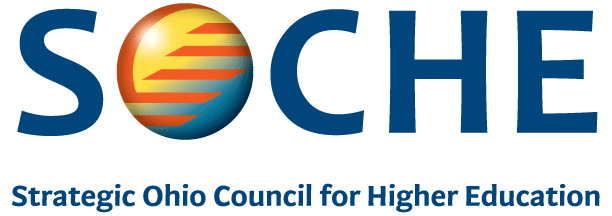Articulation Council
Purpose
The SOCHE Articulation Council was initiated by the Chief Academic Officers to develop, enhance, and expand varying strategies to improve the quality of transfer among SOCHE institutions. It is the vision of the Chief Academic Officers and the Articulation Council that SOCHE institutions will be the leaders in Ohio in assisting students in transferring credit between colleges and universities.
Key areas to facilitate this process include:
- General education transferability.
- Transfer student advising.
- Availability of academic programs.
Mission
The Articulation Council, initiated by the Chief Academic Officers, develops, enhances, and expands strategies to improve the quality of transfer among SOCHE institutions and assists students in transferring credit between colleges and universities.
Key areas to facilitate this process include:
- Fostering collaboration among institutions
- Providing opportunities for professional development
- Serving as a clearinghouse for statewide and national developments in articulation and transfer
Scheduled Meetings
The SOCHE Articulation Council meets in a virtual environment approximately three times per school year, with additional meetings as needed to plan the annual Articulation & Transfer Conference. Contact Mindy Claggett by email at mindy.claggett@soche.org for all upcoming meeting dates and to join this council.
How to Articulate
Transferring credits from one institution to another can be a confusing process, so the SOCHE Articulation Council has worked to provide you with resources to simplify it. We recommend that you begin with the FAQ’s, which provide answers to common transfer questions.
Frequently Asked Questions about Transferring:
Traditional Students (High School to College)
Non-Traditional Students (Adult Transfers)
College to College Transfers
Definition of Common Terms
An Articulation Agreement is a formalized agreement between two institutions which outlines the general transferability of students, courses and credits and facilitates movement of students from the sending institution to the receiving institution.
A Program-to-Program Agreement (or Parallel Program) is a program of study which articulates how courses at the sending institution transfer toward requirements for a specific program at the receiving institution.
The Ohio Transfer and Articulation Policy is intended to facilitate transfer from one Ohio institution to another. The entire policy is available on the Ohio Board of Regents web page.
The Ohio Transfer Module (OTM) is a subset or complete set of general education requirements that will transfer from one Ohio public institution to another. The Ohio Transfer Module includes courses in English composition, mathematics, arts and humanities, social and behavioral sciences, and natural sciences.
Transfer Assurance Guides (TAGs) are composed of courses and learning outcomes. The purpose of the TAG is to allow students to transfer, in a simple and direct manner, a core of courses that will count toward the major program.
Career Technical Credit Transfer Guides (CTAGs) help more high school and adult career-technical students to go to college and enter with college credit. Students who successfully complete specified programs technical programs are eligible to have technical credit transfer to public colleges and universities. This transfer of credit is described in Career-Technical Assurance Guides (CTAG). CTAGs are advising tools that assist students moving from Ohio secondary and adult career-technical institutions to Ohio public institutions of higher education.
Transferology is a nation-wide network designed to help students explore their college transfer options. It houses an equivalency system that allows students to determine the transferability of courses from one institution to another.
Why should you develop articulation agreements?
- To encourage and enhance interest in post secondary education for high school students
- To facilitate transfer from one institution to another
- To avoid duplication of resources
- To promote completion of degrees
- To create linkages and fosters partnerships within the learning community
When should you articulate?
- When you receive a high number of transfer students from one institution.
- When you are sharing the same information repeatedly to prospective students and advisors at other colleges.
- When you want to formalize transfer equivalencies.
- When you want to recruit transfer students from a particular institution.
Before Getting Started
- Determine to and from where your students are transferring.
- Consider what credits you accept from those institutions.
- Gather what has been established about transfer credits from these institutions.
- Assess the climate on campus and interest in creating articulation agreements.
- Gather support from appropriate administrators, staff and faculty at your institution.
- Determine the interest at the sending institution in creating agreements.
The Steps to Articulation
- Connect with the sending institution
- Create a general articulation agreement
- Evaluate all courses from the sending institution
- Build parallel program agreements
- Build course-by-course guides, if appropriate
- Inform students of new opportunities available


